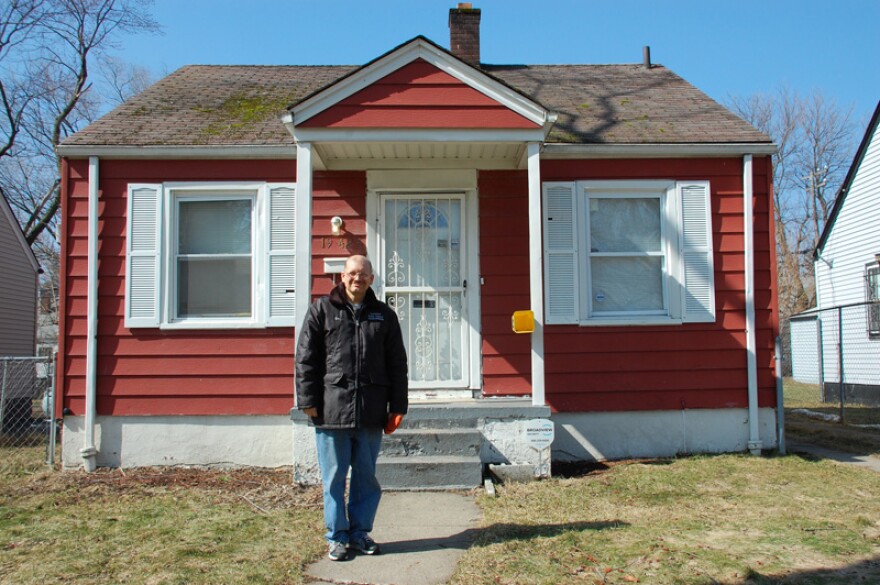Property values have plummeted across the region.
That means cities and towns have watched their tax revenue plunge as well. But many homeowners and businesses think their property taxes are still too high.
The result is a double hit.
Local governments are in fiscal crisis, and the tax courts of Michigan, Ohio and Illinois are clogged with people who want refunds.
People like Donald Betlem. http://stream.publicbroadcasting.net/production/mp3/michigan/local-michigan-959593.mp3
Betlem’s been knocked hard by the economy. His auto work dried up. He lost a home, has tons of debt. But in 2008, he saw an ad for a 667 square foot house in Detroit.
“I just happened to find it in the Sunday classifieds,” he says. “And they only want five thousand.”
So he bought it.
But a year later, the city told him his house was actually worth $50,000 on the market, and he had to pay property taxes at that level.
“I told myself, I can’t just walk away from this now. But I was really wondering what I would do, to prove that I’m being overcharged,” he says.
With some help, Betlem appealed his assessment all the way to the state’s administrative tax court, the Michigan Tax Tribunal.
Many Michiganders found themselves in similar situations when the market crashed.
They watched the true cash value of their homes (what they could actually sell for) fall faster than their taxable value (the amount used to calculate property taxes).
Kimbal R. Smith III chairs the Michigan Tax Tribunal. He sums it up like this:
“As the economy in the state of Michigan, and for that matter nationally, went in the tank, the number of filings at the Michigan Tax Tribunal have increased substantially.”
Smith says the tribunal has more than 40,000 pending cases.
For comparison, homeowners and businesses filed 5,449 property assessment appeals during fiscal year 2000 (see small cases here and large cases here).
Last year, the tribunal received 24,199 property appeals.
Smith says those numbers aren’t even final, because the tribunal is still counting appeals that were filed last summer.
The same trend is playing out regionally.
The Illinois Property Tax Appeal Board is working through about 30,000 pending cases.
The Ohio Board of Tax Appeals reported more filings last year than in almost two decades.
Officials in both states say that staff cutbacks have made matters worse.
But the backlog isn’t the only problem. Property assessment appeals can cover anything from a single family home to a General Motors plant. So refunds can range from a few hundred dollars to tens of millions of dollars in the biggest cases.
It all comes down to a property’s taxable value, the actual amount you pay taxes on.
Bob Daddow is the deputy county executive for Oakland County, which he says has $3.9 billion in taxable value in dispute at the tax tribunal.
“We aren’t gonna lose the full 3.9 billion,” Daddow says. “But we aren’t gonna lose zero.”
If that number seems huge, it is.
Oakland County has already lost billions of dollars in taxable value.
Now the county has put about $12 million aside, in anticipation of tax refunds.
Officials in Flint and Lansing say those cities are also saving money. But Bob Daddow worries other governments will be caught unprepared.
“Most people don’t recognize what’s going to happen,” he says. Even when the residential market starts to come back, “The commercial and industrial losses, the significant losses, haven’t yet been felt. So about the time they’re gonna feel comfortable that things are starting to return to normal, these losses are gonna start flowing back in again.”
Losses that could stress local governments even further.
In the case of Donald Betlem, the laid-off engineer, he got some much needed relief. Detroit eventually agreed that his little house was worth not $50,000 but $7,500.
He’ll get a tax break of hundreds of dollars. It helps.
Betlem knows he’ll never strike oil.
“If you remember the Beverly Hillbillies, it’s not a mansion in California,” he says. “But it’s home for me, so. I’ll try to make the best of it.”
But it’s not quite over. Betlem recently got his 2011 assessment in the mail. Somehow, his home’s value shot back up, to $40,000.
In the end, this case is probably headed back to the Michigan Tax Tribunal.




